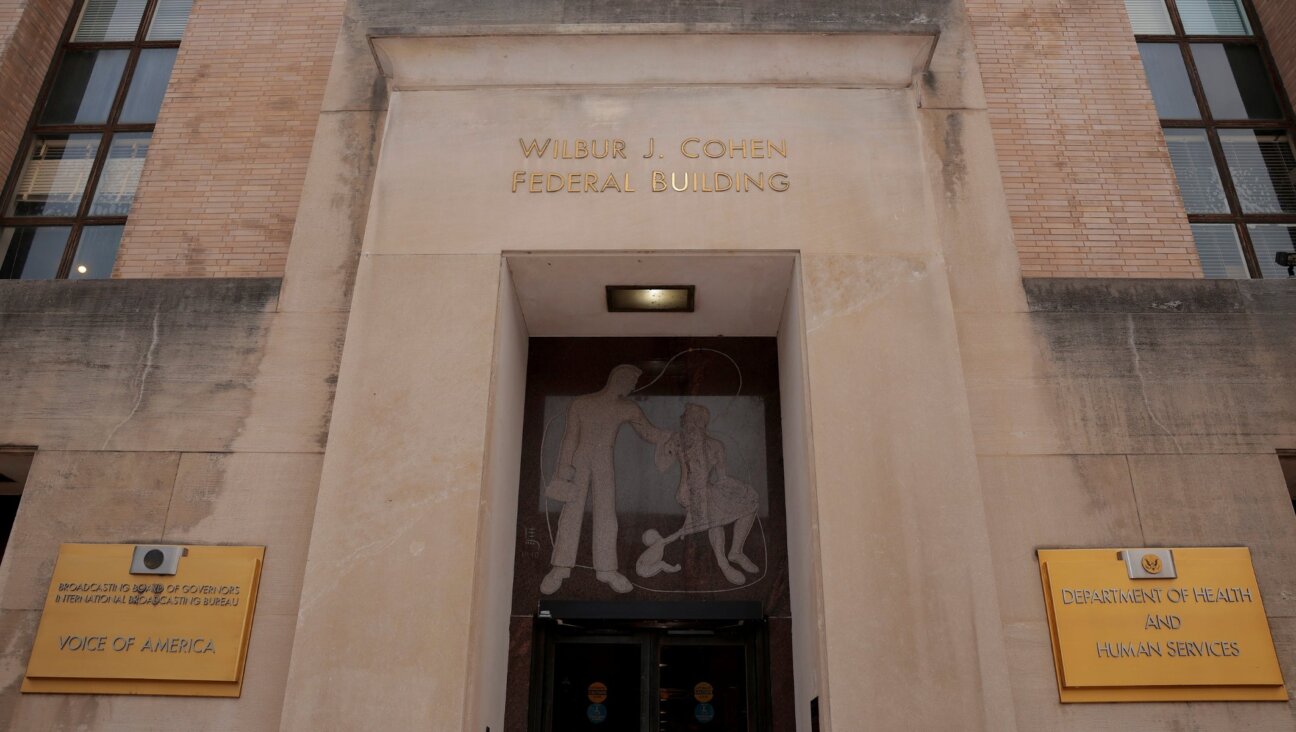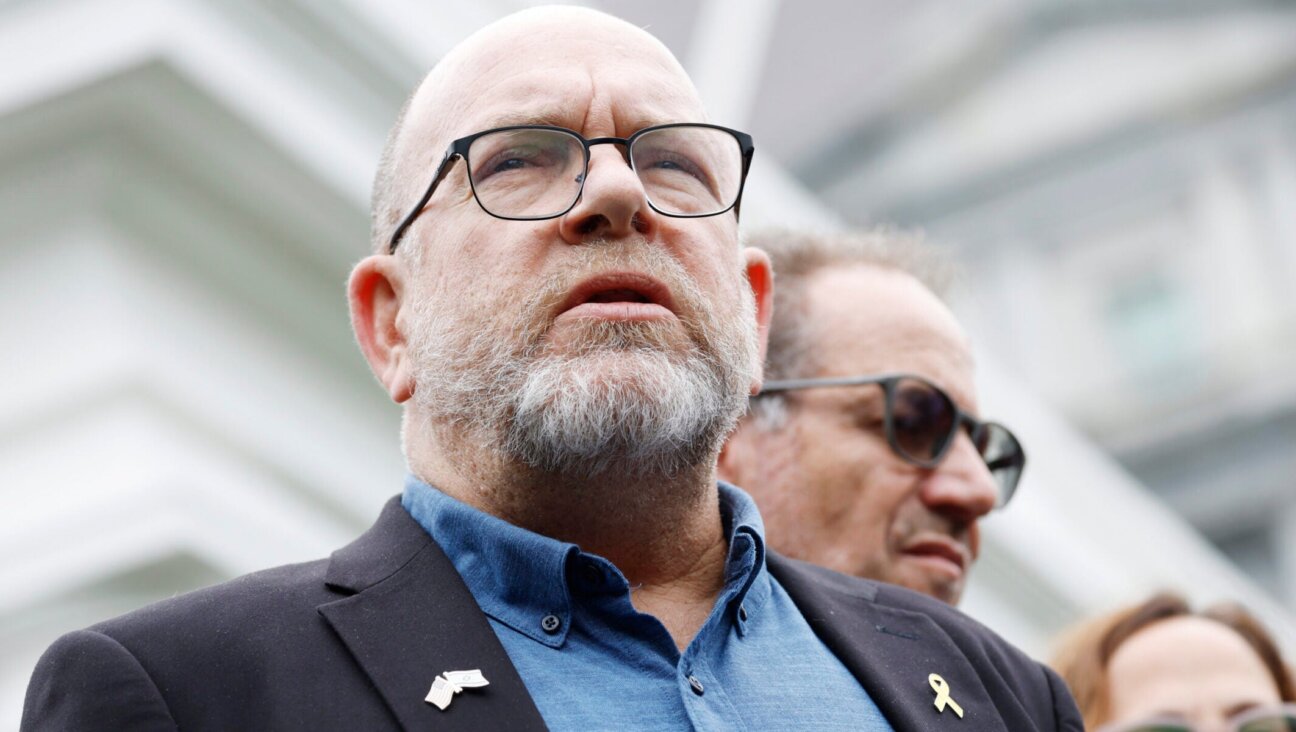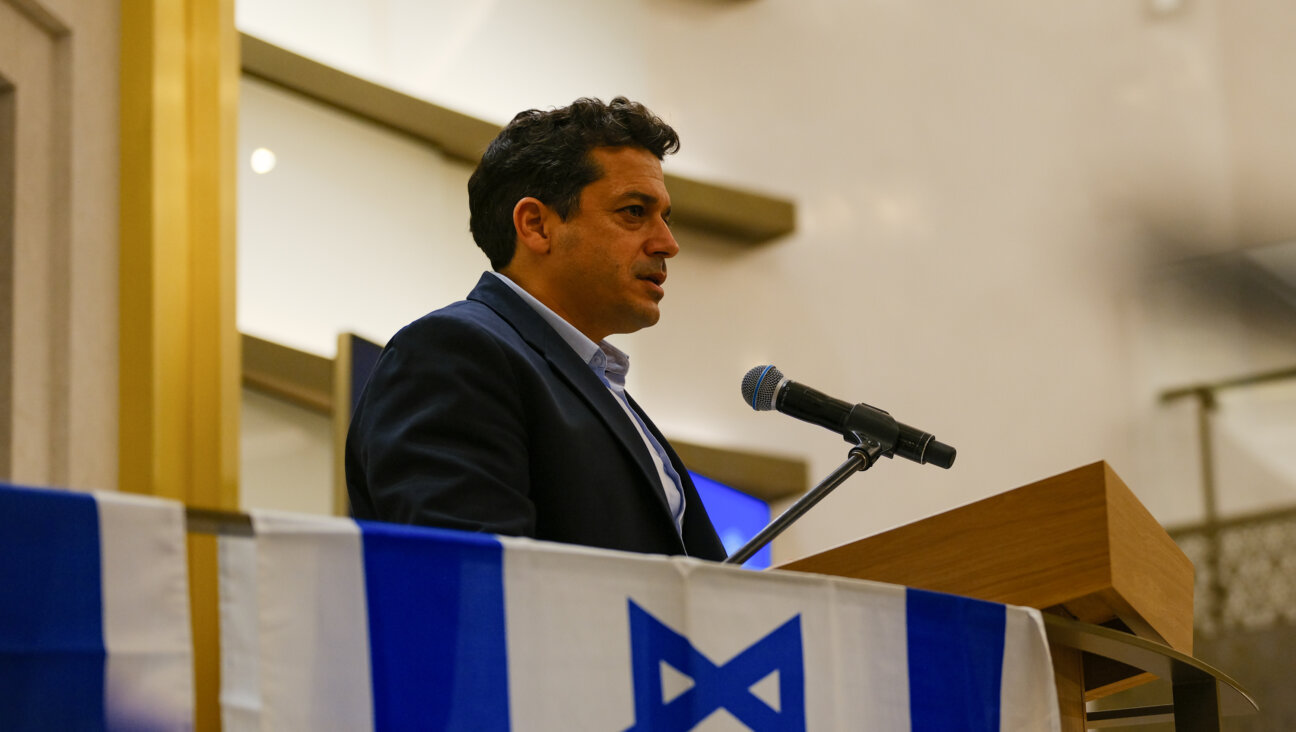GOP Senator Raps Bush And Sharon Over Talks
WASHINGTON — Senator Lincoln Chafee has a reputation as a maverick within the Republican Party, but that’s only half his troubles. Much of the pro-Israel lobby views him as a pain in the neck and wouldn’t mind seeing him gone from the Senate.
Yet, in an exclusive interview, Chafee argued that it was President Bush and Prime Minister Sharon who had failed to deliver as leaders.
The only Republican senator to vote against the war in Iraq, and one of only three to oppose Bush’s tax-cut bills, Chafee told the Forward that he worries about the growing influence of the right-wing camp in his party. Many of the national tensions between liberals and conservatives on social issues, including gay marriage, he said, could have been avoided had Bush “really been a uniter and not a divider.”
“We need leadership to calm the emotions at this time,” Chafee said, “instead of incite them.”
Chafee also seemed to take aim at Sharon when asked about the Israeli leader’s long-term strategy. “That’s a hard one,” he sighed. “I watch it every day, and I try to figure it out. Is it perpetual war? Who wants that? I don’t have a good answer.”
In his four years as a senator, Chafee has enraged the GOP leadership by repeatedly voting against Bush and publicly criticizing the president; he has antagonized conservative pro-Israel lobbyists with his criticisms of Israeli policies and calls for American pressure on Jerusalem.
Having been appointed to fill the Rhode Island Senate seat vacated when his father, John Chafee, died of a heat attack in 1999 and elected to a full term the following year, Lincoln Chafee is more powerful than most first-term members of Congress. He used that power to claim the chairmanship of a key subcommittee on the Middle East, pushing aside second-term Republican Sam Brownback of Kansas, a key conservative ally of Israel.
The elder Chafee was one of a handful of elected officials to publicly squabble with the American Israel Public Affairs Committee, the main pro-Israel group in Washington. In 1988, he survived what was rumored to be an Aipac-orchestrated attempt to unseat him.
Now, critics of the younger Chafee, 50, say he is following in his father’s footsteps by opposing legislation and other parliamentary actions endorsed by the pro-Israel lobby in Washington.
“Like father, like son,” one lobbyist quipped.
The younger Chafee was one of only four senators to vote against the recently enacted Syria Accountability Act, which authorizes the president to impose sanctions on Damascus. He has not signed several letters to the president that were intended to strengthen Israel’s position in its dispute with the Palestinians. Jewish groups, including AIPAC, were upset with several witnesses that Chafee invited to speak at recent meeting of his subcommittee, including Israeli settlement watchdog Dror Etkes of the dovish Peace Now movement.
Asked why he voted against imposing sanctions on Syria, Chafee replied that he was convinced to do so by Turkey’s prime minister, Recep Tayyip Erdogan, days before the vote, during a visit to Ankara. Erdogan, he said, argued that Syria is slowly but surely reforming, and that “if you give [Syrian president Bashar] Assad room and time, he will be more pro-Western than you might think.” Chafee said that Erdogan’s advice was enough to convince him. “That was his advice, and what more can you do than to listen,” he said.
Jewish organizational officials declined to comment publicly on Chafee, but one pro-Israel lobbyist, speaking on condition of anonymity, said that the senator often hampers effort to bolster American public support for Jerusalem’s policies. “The senator not only isn’t a torch-bearer on Israel — he’s uncooperative. He’s a problem,” said the veteran pro-Israel lobbyist. “We find that it’s better not to work too closely with his subcommittee, to render it as dormant and ineffective as possible.”
Chafee has pointed a critical finger at both Sharon and Bush, saying that the two leaders should have seized the moment last summer during the sustained security lull when Mahmoud Abbas took power as prime minister of the Palestinian Authority. Abbas “was imploring us: ‘Help me, I need help to legitimize myself with my people,’” Chafee said. “And from my perspective we just were not able to deliver for him, and he wasn’t able to retain his leadership. To me, that was a moment lost.”
Neither the Bush administration nor Sharon’s government took significant steps to “empower that moderate leader,” Chafee said. “We left him there naked.”
Despite such criticisms, Chafee said his negative reputation among conservative pro-Israel activists is undeserved. “All I can say is that I just pledge that every fiber in my body is committed to the long-term security of Israel,” he said in an interview last week. “And I just want peace for Israel’s sake and for America’s sake.”
A maverick liberal Republican, Chafee obtained a degree from Brown University in the classics before attending Montana State University’s school of horseshoeing in Bozeman. He then spent seven years working as a farrier at race tracks in the United States and Canada. He returned to Rhode Island in 1984 and was elected to the city council of Warwick, the state’s second-largest city, which now has a population of 85,000. He was elected mayor eight years later.
Chafee is popular in his strongly Democratic state — Rhode Island voted 61% to 32% for Al Gore in 2000, the highest rate of support for the Democratic presidential candidate in the nation — but extremely unpopular among his fellow congressional Republicans. The feeling appears to be mutual.
At one point in his interview with the Forward, Chafee described most of the GOP senators, even congressional veterans who are known for having a mind of their own, as too weak to stand up to the president. Bush, he said, “tells them to jump, and they ask how high.”
Chafee said he is particularly concerned about the impact of the president’s economic policies. “We have to attract independents,” he said, “but we took a good [economic] situation and made it worse. We’ve fumbled the ball here by being overly aggressive with our tax cuts.”
The senator said that he “tried to work with my fellow moderates to put some sanity into the tax cuts, but in the end without success.”
“We should have been stronger, the moderates, and I lament that strongly,” he said. “Now we have to dig out of deficits.”
The administration’s approach to the Middle East peace process is also wanting, Chafee said.
Several hours before the interview, Chafee publicly rejected the administration’s view that any progress in the peace process should be contingent on Palestinian action against terrorism. “To suggest that until these suicide attacks are ceased we cannot engage ourselves, I just think is unrealistic,” he told Secretary of State Colin Powell, during the top diplomat’s testimony before the Senate Foreign Relations Committee. Elaborating on these comments, Chafee later told the Forward: “Between the two of us, Israel and the United States, we are enormously powerful — the two of us working together — and it’s incumbent on us by virtue of that power and standing to take the initiative” on issues such as dismantling settlements, releasing Palestinian prisoners and the route of Israel’s security fence in the West Bank. “Then we’ll see where the terror goes, we’ll see if that will pay dividends,” he said.
Chafee said that although Bush should be given credit for being the first to endorse a Palestinian state “there just hasn’t been the follow-through” toward achieving that goal. American inaction, Chafee added, fuels “extremist propaganda” in the Muslim and Arab world. “By virtue of us not participating — and many criticize us for there being a vacuum of leadership on this conflict — I think it hurts us by empowering the extremists.”
Chafee said that he doesn’t see any real chance of advancing the Israeli-Palestinian peace process in the near future. “No one wants to address it, because it’s fraught with danger,” he said.
Without explicitly characterizing the nature of that political danger, Chafee made clear that he was referring to the electoral threat of pro-Israel voters. He mentioned the comment that Democratic presidential candidate Howard Dean made recently about the need for American policy in the region to be “even-handed.”
“Howard Dean ventured ever so slightly into it, and everyone just went underground,” Chafee said. “You need to articulate what that means and not be afraid. It’s an important issue, and let’s have a discussion about it.”
Chafee said he has no grudge against what he described as the effort by AIPAC activists to undermine his father’s reelection effort in 1988. “Let bygones be bygones,” he said. “I respect AIPAC, and I know that I’ll work hard [to earn] their respect back. … I hope that if they have a gripe we can discuss it.”















